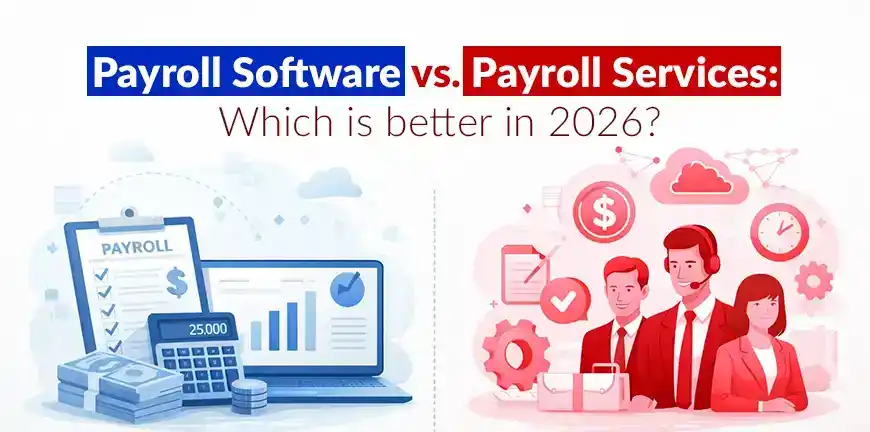
What is Virtual Staffing: Benefits and Tips
15/12/2025
What Is Performance Management?
16/12/2025- What is Statutory Compliance in Payroll?
- Who Manages Statutory Compliance in Payroll?
- What are the Benefits of Statutory Compliance in Payroll?
- Which Laws Govern Payroll Statutory Compliance in India?
- How Can Companies Ensure Payroll Compliance in India?
- What Does a Payroll Statutory Compliance Checklist Look Like for 2026?
- How to Conduct a Payroll Compliance Audit Effectively?
- What Are the Risks and Penalties of Payroll Non-Compliance?
- Why Should Businesses Outsource Payroll Compliance to Experts?
- Are You Looking for a Compliance Partner?
- Key Takeaways
- Frequently Asked Questions
Statutory compliance encompasses all areas of an organization’s functioning. The statutory compliance that pertains to payroll is referred to as statutory compliance in payroll. Statutory compliance in payroll can either be handled in-house or by an HR company that will act as a payroll and compliance partner.
Let’s understand all aspects of statutory compliance in payroll in detail to help companies gather valuable insights to make the process more streamlined.
What is Statutory Compliance in Payroll?
Statutory compliance in payroll refers to the legal obligations that companies must adhere to when processing employee salaries every year without any deviation. Compliance in payroll ensures timely deductions, contributions, & filings as mandated by Indian labour laws, such as PF, ESIC, TDS, Professional Tax (PT), Gratuity,& Minimum Wages.
Complying with these mandates wholeheartedly helps organisations avoid penalties, audits, & legal disputes, while ensuring employees receive accurate earnings and statutory benefits. Moreover, complete alignment with the payroll compliance checklist fosters trust, promotes transparency, & keeps businesses in line with ever-evolving government regulations.
Under the new 2025 regime, most “criminal” penalties (imprisonment) for first-time offences have been decriminalised & replaced with compounding fines (financial penalties only), aiming to boost “Ease of Doing Business”.
Why Is Statutory Compliance Important for Payroll Management?
Statutory compliance in payroll ensures that the workers are paid fair wages and work fair hours to earn them. It also reduces the risk of lawsuits or penalties incurred by the business because of non-compliance. Moreover, it leads to effective dispute resolution and ends up creating a work environment that is healthy, safe, and friendly for everyone.
Here are 5 reasons that highlight the importance of compliance in payroll:
1. Accurate Payroll Processing & Error Prevention
Statutory compliance in payroll ensures accurate salary calculations, timely deductions, & statutory contributions, preventing payroll errors that negatively affect employee satisfaction and trust.
2. Avoidance of Penalties & Legal Risks
Compliance in payroll acts as a shield to protect organisations from penalties, legal disputes, & government audits by maintaining strict adherence to evolving labour & tax regulations.
3. Strengthening Employer Reputation & Trust
Compliance changes in payroll as per the latest labour mandates enhance organisational reputation as a compliant, ethical employer committed to transparent payroll practices & employee welfare.
4. Better Financial Planning & Operational Efficiency
Statutory compliance in payroll improves financial planning & operational efficiency by preventing unexpected fines, interest payments, & compliance-triggered cost escalations.
5. Enhanced Employee Confidence & Retention
100% adherence with the payroll compliance checklist builds long-term workforce confidence as employees receive legally compliant benefits, fostering loyalty, retention, & workplace stability.
Who Manages Statutory Compliance in Payroll?
Statutory compliance in payroll is managed either by the HR or the compliance team within the company. It is mostly managed by a person with a strong HR or legal background and a good knowledge of the laws applicable in the country. Compliance in payroll can be managed by either one or a few people or an entire team, depending on the size of the company and its needs.
What are the Benefits of Statutory Compliance in Payroll?
Statutory compliance in payroll benefits both employees and employers. Here is how statutory compliance in payroll benefits both:
1. How does statutory compliance in payroll benefit employers?
- Reduces the risk of lawsuits or other penalties arising from payroll non-compliance.
- Improves the brand reputation as a company that cares about employees.
- Improves the quality of candidates applying to the company because of a better reputation.
- Improves the trust that employees and investors have in the company, enabling them to tide over difficult times.
2. How does statutory compliance in payroll benefit employees?
- They get paid on time and can meet their commitments.
- Employees are paid a fair wage and can demand more if they are paid unfairly.
- Employees are not discriminated against based on gender or otherwise.
- They have a way of registering a complaint to secure their rights in case of non-compliance.
Which Laws Govern Payroll Statutory Compliance in India?
If you are a company operating in India, there are several Acts set by the Government for the safety, welfare, and well-being of the employees that every company must follow. Here is a payroll compliance checklist that your organization must follow:
1. Employee Provident Fund (EPF) Act, 1952
Ensures that there is an accurate deduction towards a fund to aid employees in a crisis.
2. Employees’ State Insurance (ESI) Act, 1948
Ensures that there is a small allocation of funds to the ESIC, which ensures a minimum amount of insurance for the employee.
3. Professional Tax (PT)
A tax is due for deduction from the employee’s salary towards the state, and it can be a maximum of 2500.
4. Income Tax Act, 1961
It specifies that a certain amount of tax will be deducted from the income of the individual and puts forth guidelines on how it must be handled.
5. Payment of Gratuity Act, 1972
When the employee has completed a term, he/she is eligible for a gratuity that must be paid to them by the employer.
6. Payment of Bonus Act, 1965
A bonus must be paid after a certain period, which is as directed by this act.
7. Minimum Wages Act, 1948
An employee must be paid a minimum salary according to the Minimum Wages Act.
8. The Equal Remuneration Act, 1976
It says that employees in the same role must be paid equal wages, irrespective of their gender.
9. Maternity Benefit Act, 1961
This Act provides benefits to mothers and ensures they are paid a minimum salary during maternity leave as well.
How Can Companies Ensure Payroll Compliance in India?
Here are 5 proven ways companies can manage 100% compliance in payroll:
1. Automate Payroll Processes
Implement reliable payroll software to automate salary calculations (gross and take-home), deductions, filings, & updates. This approach ensures accurate, timely, & error-free compliance with evolving statutory rules.
2. Stay Updated with Labour Law Changes
Regularly track amendments in PF, ESIC, TDS, Minimum Wages, gratuity, & state-specific regulations to ensure compliance changes in payroll are updated in real-time, thereby reducing the instances of penalties & lawsuits.
3. Maintain Accurate Employee Records
Properly record & maintain detailed, updated documentation on attendance, wages, contracts, benefits, & tax declarations. This prevents discrepancies and ensures smooth audits & statutory inspections.
4. Conduct Routine Payroll Audits
Perform periodic internal & external payroll compliance audits to identify gaps, rectify miscalculations, verify submissions, & continuously improve payroll accuracy & governance standards.
5. Partner With a Payroll Compliance Expert
Engage a specialised payroll compliance partner like Alp Consulting to manage filings, statutory updates, documentation, & audit readiness, ensuring 100% compliance and reducing organisational risk.
What Does a Payroll Statutory Compliance Checklist Look Like for 2026?
Here is a consolidated payroll compliance checklist that companies can use to ensure 100% compliance at all stages:
| Category | Compliance Requirement | Key Actions Required | Frequency |
| Provident Fund (PF) | EPF Act Compliance | Calculate 12% contributions, generate ECR, deposit employer/employee share, file returns | Monthly |
| Employees’ State Insurance (ESI) | ESIC Act Compliance | Deduct and deposit contributions, maintain employee records, update IP details | Monthly |
| Professional Tax (PT) | State-specific PT rules | Deduct PT as per the slab, deposit challans, and file returns | Monthly / Quarterly (state-wise) |
| Income Tax (TDS) | IT Act Compliance | Deduct TDS, deposit challans, issue Form 16, file returns | Monthly / Annual |
| Labour Welfare Fund (LWF) | State-specific LWF laws | Deduct employer/employee contributions, deposit funds, and maintain registers | Half-yearly / Annual |
| Minimum Wages | Minimum Wages Act | Ensure updated wages as per the latest state notifications | Ongoing |
| Payment of Wages | Payment of Wages Act | Disburse salaries on time, maintain payroll records, and provide payslips | Monthly |
| Bonus Act | Payment of Bonus Act | Calculate annual bonus eligibility and payouts, maintain registers | Annual |
| Gratuity Act | Payment of Gratuity Act | Track eligibility, ensure timely settlement, and maintain records | Ongoing |
| Shops & Establishments | State-specific S&E Act | Maintain attendance, leave, wage registers, and notices | Monthly / Ongoing |
| POSH Compliance | Prevention of Sexual Harassment Act | Maintain IC constitution, documentation, and reporting compliance | Annual |
| Contract Labour | CLRA Act | Maintain registers, ensure contractor compliance, and verify statutory filings | Monthly / Ongoing |
| Payroll Registers | Government-prescribed registers | Maintain wage register, attendance, deductions, and overtime records | Monthly |
| Statutory Filings & Challans | PF, ESIC, PT, TDS | Submit all returns & challans on time with accurate data | Monthly / Quarterly |
| Audit Readiness | Internal & statutory audits | Maintain documentation, reconcile payroll, & ensure digital record keeping | Periodic |
How to Conduct a Payroll Compliance Audit Effectively?
Here are 6 steps to conduct a payroll compliance audit effectively:
1. Review Payroll Policies & Legal Requirements
Examine existing statutory compliance in payroll policies thoroughly and ensure alignment with PF, ESIC, TDS, PT, Minimum Wages, & validate adherence to updated 2026 statutory regulations.
2. Verify Employee Data & Documentation
Audit employee records, contracts, attendance logs, salary structures, & declarations to ensure accurate payroll inputs & eliminate inconsistencies or outdated information.
3. Reconcile Salary Calculations & Deductions
Cross-check gross salary, allowances, OT (overtime), leave adjustments, & statutory deductions to confirm compliance with legal thresholds & organizational policies.
4. Inspect Statutory Filings & Challans
Validate timely PF, ESIC, PT, & TDS filings, verify challans, submissions, & ensure no missed deadlines or discrepancies in deposited amounts.
5. Evaluate Payroll System Controls
Assess software accuracy, access controls, audit trails, automation workflows, & ensure the system minimizes errors while maintaining secure, compliant payroll operations.
6. Document Findings & Implement Corrections
Prepare detailed audit reports, identify compliance gaps, deploy corrective actions, update processes, & ensure readiness for future statutory audits & inspections.
What Are the Risks and Penalties of Payroll Non-Compliance?
Payroll non-compliance can lead to several problems for the organization. Some of the risks of non-compliance in payroll are:
- Possibility of legal issues being raised by employees.
- Due to non-compliance with payroll, penalties could be enforced by the government.
- Loss of reputation, which can in turn attract mistrust and hesitation from candidates, vendors, and customers.
- It can invite unnecessary audits from the authorities, which can waste a lot of time.
Why Should Businesses Outsource Payroll Compliance to Experts?
Here are 5 reasons why businesses should outsource payroll compliance to experts like Alp Consulting:
1. Eliminates Compliance Risks
Experts stay updated with evolving PF, ESIC, TDS, PT, & labour laws, ensuring error-free payroll compliance & eliminating risks of penalties, audits, or legal hassles.
2. Saves Time & Operational Effort
Outsourcing to a top payroll agency like Alp removes the administrative burden from HR teams, allowing them to focus on core business, talent management, & strategic initiatives instead of complex compliance tasks.
3. Ensures Accurate & Timely Filings
Compliance partners manage all challans, returns, & documentation with precision, guaranteeing timely submissions and preventing delays that can cost big time or statutory non-compliance issues.
4. Improves Data Security & Confidentiality
Professional payroll partners use secure systems, audit trails, & controlled access, protecting sensitive employee payroll information from internal errors or security breaches.
5. Access to Expertise & Best Practices
Businesses benefit from experienced compliance specialists, updated tools, & standardised processes, ensuring consistent, scalable, & audit-ready payroll operations across all locations.
Are You Looking for a Compliance Partner?
Alp Consulting can be your statutory compliance partner in payroll. We will ensure that the payroll process in your company follows statutory compliance and is error-free and accurate for every employee. You can outsource your payroll process in its entirety to us, and we will take care of it.
Rest assured that any compliance issues will be addressed during an audit, that the right resources will be assigned to the job, and the stakeholders will be informed of any flaws in the payroll process.
Alp Consulting will be continuously monitoring the payroll process and addressing any issues of misconduct, data breach, or the like, which could lead to employee dissatisfaction and a loss of reputation for the company. Connect with us today to ensure that your payroll is 100% compliant with statutory norms.
Key Takeaways
- Statutory payroll compliance ensures accurate salaries, legal adherence, and protects companies from penalties.
- Following PF, ESIC, TDS, PT, and wage laws builds trust and organisational credibility.
- Regular audits, automation, and updated records strengthen payroll accuracy and compliance readiness.
- Non-compliance risks include penalties, lawsuits, damaged reputation, and unnecessary government audits.
- Outsourcing payroll compliance to experts ensures accuracy, security, timely filings, & minimal organisational risk.
Frequently Asked Questions
1. What does payroll compliance include?
Statutory compliance in payroll includes things like income tax deduction and insurance allocation in payroll, along with the deduction of professional tax and the award of gratuity to eligible employees. It also involves ensuring that everyone is paid a fair wage, irrespective of gender.
2. How to do a payroll compliance audit?
To do a payroll compliance audit, you need to have a payroll compliance consultant and trusted members from your payroll team to share the data with them. A payroll compliance audit can take a few days as a detailed analysis of the company’s payroll will be done. It must follow an established process and there must be well-established KPIs too.
3. Who does a payroll compliance audit?
A payroll compliance audit is done by a payroll compliance professional, and the data is shared by members of the payroll team. This is then shared with the government. A payroll compliance audit could be conducted by the government too to ensure that everything is in order.
4. Are payroll compliance laws the same everywhere?
Payroll compliance laws are different in different parts of the world, with each country having its tax laws and even terms for gratuity or maternity leaves. This is why a payroll compliance consultant who is familiar with the nation’s laws must handle the payroll compliance process.
5. How often should audits be done?
Payroll compliance audits must be conducted at least once a year, with quarterly internal reviews to ensure accuracy, legal adherence, and timely corrective actions.
6. Are payroll compliance laws the same across all Indian states?
No, payroll laws vary by state, especially Professional Tax, Minimum Wages, LWF, & Shops & Establishments provisions, necessitating region-specific compliance updates.
7. What happens during a compliance inspection?
Inspectors review payroll records, statutory filings, employee registers, wage practices, & documentation to verify legal compliance, identify gaps, & enforce corrective actions.
8. What is the difference between payroll compliance and HR compliance?
Statutory compliance in payroll focuses on salaries, taxation, and statutory deductions, whereas HR compliance covers broader labour laws, workplace policies, employee rights, & regulatory governance.
9. Can payroll compliance be automated using HR software in 2026?
Yes, modern HR software automates calculations, filings, updates, & documentation, ensuring real-time compliance accuracy and reducing manual errors & administrative workload.

Yugandhara V. M
Yugandhara V. M serves as the Assistant Vice President – HRO at Alp Consulting Ltd., bringing over 14 years of rich experience in Human Resource Outsourcing, payroll management, and statutory compliance. He specializes in driving process excellence across HR operations, ensuring seamless service delivery and compliance with labor laws. Yugandhara’s expertise lies in managing large-scale client engagements, optimizing HR processes, and implementing efficient workforce management systems that enhance organizational performance. He also leads comprehensive payroll services, ensuring accuracy, timeliness, and compliance for diverse client portfolios.



